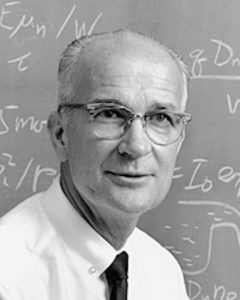
William Shockley Jr.
*William Shockley Jr. was born on this date in 1910. He was a white-American physicist and inventor.
William Bradford Shockley Jr. was born to American parents in London and was raised in his family's hometown of Palo Alto, California, from the age of three. William Hillman Shockley's father was a mining engineer who speculated in mines for a living and spoke eight languages. His mother, May Bradford, grew up in the American West, graduated from Stanford University, and became the first woman U.S. Deputy mining surveyor. Shockley Jr. earned his Bachelor of Science degree from Caltech in 1932 and a Ph.D. from MIT in 1936.
The title of his doctoral thesis was Electronic Bands in Sodium Chloride, a topic suggested by his thesis advisor, John C. Slater. After receiving his doctorate, Shockley joined a research group headed by Clinton Davisson at Bell Labs in New Jersey. The next few years were productive for Shockley. He published several fundamental papers on solid-state physics in Physical Review. In 1938, he got his first patent, "Electron Discharge Device," on electron multipliers. Shockley was the manager of a research group at Bell Labs that included John Bardeen and Walter Brattain. The three scientists were jointly awarded the 1956 Nobel Prize in Physics for "their research on semiconductors and their discovery of the transistor effect."
Due to Shockley's attempts to commercialize a new transistor design in the 1950s and 1960s, California's "Silicon Valley" became a hotbed of electronics innovation. While a professor of electrical engineering at Stanford University, Shockley became interested in the disparate field of biology, and he embraced long-since debunked notions regarding race and eugenics. Shockley considered this the most critical work and maintained an obsession through the final days of his life. Similar to the pseudo-scientific Social Darwinism that had been espoused many decades prior (including Stanford's founding president David Starr Jordan), Shockley tried to argue that a higher rate of reproduction among the less intelligent was having a dysgenic effect and that a drop in average intelligence would ultimately lead to some vaguely described "decline."
He said in a debate with psychiatrist Frances Cress Welsing M.D. and on Firing Line with William F. Buckley Jr.: My research leads me inescapably to the opinion that the major cause of the American Negro's intellectual and social deficits is hereditary and racially genetic in origin and, thus, not remediable to a major degree by practical improvements in the environment. Shockley's recrudescent views were partly based on the writings of psychologist Cyril Burt and supported by the Pioneer Fund. Shockley also proposed that individuals with IQs below 100 be paid to undergo voluntary sterilization.
Anthropologist Roger Pearson has defended Shockley in a self-published book co-authored with Shockley. The University of Wisconsin–Milwaukee professor Edgar G. Epps argued that "William Shockley's position lends itself to racist interpretations." In 1981, Shockley filed a libel suit in Atlanta against the Atlanta Constitution after a science writer, Roger Witherspoon, compared Shockley's advocacy of a voluntary sterilization program to Nazi human experimentation. The suit took three years to go to trial. Shockley won the suit but received only one dollar in damages and no punitive damages.
Shockley's biographer Joel Shurkin, a science writer on the staff of Stanford University during those years, sums this up by saying that the statement was defamatory. Still, Shockley's reputation was not worth much before the trial reached a verdict. Shockley taped his telephone conversations with reporters and then sent the transcript to them by registered mail. At one point, he toyed with the idea of making them take a simple quiz on his work before discussing the subject with them. His habit of saving all his papers (including laundry lists) provides abundant documentation for researchers on his life.
In his later life, while Shockley was a professor of electrical engineering at Stanford University, he dedicated himself to promoting racism and eugenics. A 2019 study found him the second-most (behind Arthur Jensen) controversial intelligence researcher among 55 persons covered. William Shockley said to have "brought silicon to Silicon Valley" and promoted racist views, died of prostate cancer on August 12, 1989, at the age of 79. At his death, he was almost completely estranged from most of his friends and family, except his second wife, the former Emmy Lanning. His children reportedly learned of his death by reading newspapers. Shockley is interred at Alta Mesa Memorial Park in Palo Alto, California.